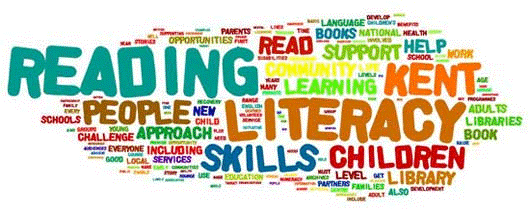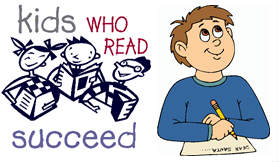
ENGLISH GUIDANCE

We aim to ensure that all children foster a love of reading and writing and that we prepare children for the next phase of their education. We teach English through dedicated English lessons across the school, as well as continuously developing the skills across the curriculum. The discrete English lessons have slightly different formats depending on the age and stage of the pupils.
Early Years
In the Early Years Foundation Stage there is a great emphasis on speaking and listening as well as phonics. Children have daily English sessions and phonics sessions. Work is planned around relevant, exciting texts which foster a love of reading, speaking and writing.
Key Stage 1
In Key Stage 1 all pupils have a English lesson daily; this involves speaking, listening, reading and writing. Phonics sessions are taught daily in groups related to the phases of phonics teaching and learning. The school has a rigorous and structured programme in place for teaching phonics, spelling and handwriting. Pupils learn to love books and other forms of text, including audio and visual texts. In writing the children are taught the skills in order to become confident writers and to write for a range of different purposes and audiences.
Key Stage 2
Key Stage 2 classes have a dedicated English lessons which involve text, word and sentence level work. Children read whole class texts, learning about different genres of writing through these texts. They write regularly and receive feedback and targets to help them improve through systematic marking using two stars and a wish.
Home learning
Children are set home learning weekly, usually linking to objectives taught in class, for example:
Write a diary about a WW1 refugee, Write a sentence about this picture, and Write a recount of your weekend, Find sounds beginning with t.
Marking
We mark pieces of writing in class at the end of the unit (2-3 weeks) using 2 stars and a wish. This allows children to be aware of things they have done and 1 thing to improve on, these are linked to individuals targets.

Helpful Documents
Please use the following documents to help you understand more about Literacy at Orleans and how you can support your child at home.
Please click on the headings for the areas you wish to explore further.
A copy of our English Policy
Handwriting
From Reception we teach cursive handwriting joins alongside print. Children are shown how to do this in class and then can repeat at home within our home learning time. A copy of the style can be found here.
Spelling Lists
From Year 1 and above, each week, children take part in a ‘spelling check’. This is designed to assess the phonics and spelling knowledge that children are secure in and what they need to consolidate further. Children are encouraged to self-assess this learning so they have an understanding of where their own strengths are and where they need further practise and support. The spellings are practised in the phonics and spelling sessions in class but they are also sent home as part of the weekly home learning sheet (they can be found on the left hand side). Children should practise reading and spelling these until they can spell them from memory
- Look cover check write is one way to do this; look at the word, read it, cover it, spell it. Repeat this until the spelling is correct.
- Echo spell check is another way; write the word saying each letter name as you write, repeat the word five times, each time saying the letter names. On the 6th time, close your eyes and write it. Hopefully they will recall the word.
Vocabulary, Grammar and Punctuation
In line with the national curriculum, all children in our school are taught aspects of grammar from an early age, introducing terms such as noun, verb, letters, phonemes, adjectives, adverbs etc. These are taught in a fun way and alongside English units so that children make meaningful links as well as preparing them for their Literacy journey. In Year 2 and Year 6 they will sit a SPAG (Spelling, Punctuation and Grammar) test to assess their knowledge and understanding.
Guided Reading
Pupils read with a teacher at least once every two weeks. This is done as part of a small group guided reading session. A group will consist of between six to eight children who are working at the same level in reading.
A guided reading session focuses on an objective relevant to their stage of learning, e.g. To use a contents page to locate information OR to talk about what happened in a story in the correct order. During a guided reading session there will be some group discussion of a text as well as some reading practise. As the children read, the adult will circulate, listening to, assessing and supporting the children as needed.
Guided Reading sessions are an effective way of ensuring that all pupils have regular, extended, quality reading time with a teacher and develop their comprehension skills.
Reading within a group also means that there are many opportunities for discussion, confidence building and peer learning. It also means that teachers and teaching assistants have a secure, up to date knowledge of where children are working at in reading and where they need to move to next.
We know that guided reading is an effective way of assessing and developing the children’s reading skills as we have been tracking children’s achievements in reading.
This also links to writing, children who read are emerged in rich language and therefore transfer this into their writing. It also allows them to mimic styles and ideas from well-known authors.
Phonics
At Orleans we use a combination of synthetic phonic schemes to enhance children’s learning in phonetic development. We use a combination of different phonic schemes which allow all our children to develop at their own individual rates while meeting the needs of the Curriculum.
Children are taught phonics in differentiated groups. This is because children learn to read and write at different rates and in different ways. It allows teachers to carefully tailor the learning to meet specific needs and therefore maximise the progress of every child. This starts in Reception until Year 3. The groups are fluid and regularly reviewed and assessed.
Children may change groups depending on their understanding of phonics as the scheme develops. The decision to move a child is only made after assessments have been carried out and all aspects of the child’s learning have been carefully considered. Parents and children are informed when they move.
Key Words
Key word sets are sent home on sheets of coloured card. These are for reading and writing. These are checked every few weeks in EYFS and Key Stage 1. If a child is able to read all the words on sight (without hesitation or ‘sounding out’), and spell every word. They are then issued the next set of key words. There are 15 sets altogether. The key words relate to the ‘high frequency words’ (the most common words in the English Language).This is designed to increase the fluency of children’s reading and spelling.
Reading books
These books are banded according to colours and are carefully selected according to your child’s ability of word reading. These go home and are to be read by the child to the adult, it is likely they will re-read this book several times throughout the week so they can develop both word reading skills and comprehension understanding. Throughout the school the children have a ‘book change day’ where their reading diary is checked for any comments and their books are changed. Please feel free to comment in here too.
Reading Schemes
Our graded reading scheme – which incorporates a range of books from different highly evaluated series introduces children to new words gradually. We use a selection of schemes including Oxford Reading Tree, Big Cat Phonics, Rigby Star and Project X. These books are levelled into colour bands so that children can progress through the books in levels of difficulty. Reading deliberately patterned, simple, repetitive grammatical structures helps children to achieve early success. This success creates confidence – an essential prerequisite for ongoing, successful learning.
What English looks like in each year
Here you will find some further detail on what your child should achieve by the end of the year,
- Year 1 Overview for English
- Year 2 Overview for English
- Year 3 & 4 Overview for English
- Year 5 & 6 Overview for English
Key Stage 2 Curriculum Evening
This is the PowerPoint shared during this year’s curriculum evening. It outlines how to support your child.
